Love Your Life!

Sallie A. McGuire-Stall, MS, BCC
Why Work with Sallie?
Executive Coach | Integrative Health and Wellness Coach | Life Coach | Neuroscience in Coaching | Human Resources Director | COO | Psychology BA | Healthcare Administration, MS
Dedicated to the betterment of people within their personal, work, and workplaces, Sallie is a highly experienced coaching and health services professional.
As a board certified Executive Coach, with qualifications in integrative health and wellbeing, neuroscience, psychology, and life coaching Sallie adopts a whole person perspective to mental and physical development with individuals and teams.
With over 20 years of working in Human Resources at Director level, having experienced the transformative effects coaching had in the organizations she worked with, Sallie was called to train in this sector herself.
From her psychology discipline and work within the healthcare sector, Sallie understood that meaningful change for successful work and living is not made through one coaching type alone. Our thoughts, patterns and behaviors are with us in our work, home and social lives. Change therefore, is a whole person approach and requires an understanding of how to identify and simplify the solutions required.
Sallie’s unique approach to whole person coaching is supported with experience in large organizational operations. Utilizing a range of tools and technologies to gather and assess data, and strong interpersonal skills to facilitate knowledge sharing, moments of insight, and strategic thinking to advise on change processes that can radically shift you and your teams towards more successful outcomes.
For your mental and physical health, ambition, wellbeing and productivity. Sallie is an experienced, educated advisor to shape your pathway to success.
Based in Buffalo, New York, Sallie works with organizations across the globe and meets with clients in her Amherst office as well as online.
Sallie is certified with:


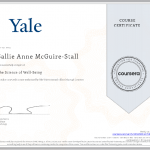

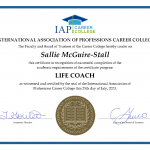
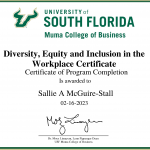
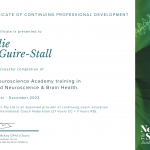
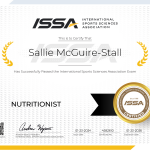
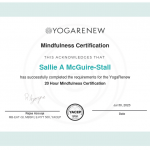
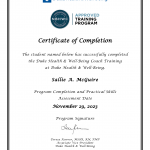
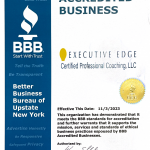
Sallie has worked with:










































Sallie’s Journey to Wellbeing & Coaching
With qualifications, credentials and experience galore, Sallie’s real journey to becoming an Executive Wellbeing Coach started in childhood with a troubled relationship to food and socially conditioned body dysmorphia.
My Personal Journey to Health and Wellbeing
I began exercising in high school, where I played soccer and, briefly, basketball. Everyone around me looked to be tiny; I weighed 135 pounds and stood 5’4″, which was a decent weight. My bodily dysmorphia kicked in, and I became fixated on exercising. Most mornings, I would wake up at 5:00 a.m. to do an hour of aerobics before riding my bicycle for four miles outside before school. During the day, I ate sparingly. For lunch, I had a salad with lettuce, a few carrots, and diet dressing. I started labeling foods as good or bad, with terrible meals off limits. I believed I was on the right track; I was skinny, but I had no energy.
When I left high school and proceeded to college, my bad eating habits developed into Bulimia. Bingeing and purging became the norm, along with rigorous weight training and aerobic workouts. I exercised to allow myself to eat, but I never let myself consume sweets, chips, or regular meals. I didn’t realize my eating was disordered until years later. Later on, I discovered that my compulsive eating was caused by anxiety and loneliness. I was practically eating my emotions; each binge gave me a boost of serotonin, followed by post-binge remorse and, of course, extended exercise sessions. I concealed this behavior from everyone. After several years of Cognitive Behavioral Therapy, I was finally able to change my behavior. I learned to control my emotions and recognize triggers that could put me up for a binge/purge cycle. For the first time in my life, I felt free and in charge of myself.
My focus shifted away from myself and toward my family after I married and had children. The bingeing and purging ended. I was a full-time working mother. During that time, I tried every diet available and continued to exercise. I gained weight while pregnant, and after my daughter was born by C-section, I promptly began exercising. We’d been home from the hospital for about five days, and I started to ride my stationary bike, eager to get back in shape. I began bleeding from my wound and had to seek medical attention. My doctor chastised me and ordered that I not exercise until he had fully cleared me to do so.
As a wife, mother, full-time employee, and graduate student, I needed to marshal all of my energy and power. I was stressed out and sleep deprived, so I started having happy hour after work every day while preparing supper. I continued working out with a personal trainer at 5:00 a.m. three times a week, as well as doing cardio five days a week. I was on autopilot as one day passed into the next. I was exhausted and prone to illness, but I forced myself to persevere while working and caring for our children. I had no idea how much stress was wreaking havoc on my body; I was stuck on a never-ending merry go round.
When I discovered running, it revolutionized my life. A buddy persuaded me to accompany her to Las Vegas to run in a marathon. I knew I had only four months to train for the race, so a marathon was out. I registered for the half marathon and immediately went to Amazon to get the book “Marathon Running for Dummies.” I was overweight when my daughter was born, so I started training for the race by running two miles, then four miles, and then 13.2 miles over several months. These miles were not nice; I started at 16 minutes per mile, was in agony, and gradually worked my way down to 11 minutes per mile by race day. Running enabled me to get off the merry-go-round. I slept better, was less worried, started eating to fuel my runs, and felt more energetic than ever. My mental health and well-being improved, and I began to enjoy life rather than simply survive it. I completed my first full marathon a year later.
My quest to maintain my health and well-being lasted until I reached perimenopause, then menopause. In society, this problem is not freely discussed. I found myself alone, wrestling with what was going on. To be honest, I had no idea; I believed I was falling apart; despite my diet and exercise regimen, I was gaining weight, and it appeared that my physique had altered overnight. I couldn’t sleep, my anxiety skyrocketed, I had mood swings, and I awoke with nocturnal sweats. I went to my OB/GYN doctor for answers, and she ran tests and did blood work, only to find that you are on the verge of menopause. I was taken aback by her lack of concern or casual attitude toward the entire incident. How can there be nothing wrong with me? My poor husband and children just rolled with the punches, wondering who kidnapped their wife and mother. My husband, a physician, recommended that I see an endocrinologist. So I scheduled an appointment, and the endocrinologist doctor reviewed the same blood tests that my OB/GYN doctor did, but this time the endocrinologist said. “You are not on the cusp of menopause; you are in full blown menopause.” My response was, “Hallelujah, I’m not crazy!” She started treating me, and within six months, I felt like myself again.
Then Covid struck! We were all restricted to our homes, but fortunately, we had a full gym built up in our basement. Many fantastic things happened during covid; my spouse became an expert baker, and I met a woman on Facebook who conducts virtual personal training and nutrition coaching. Her name is Carey Adam, and she resides in Costa Rica. Carey works with women of all ages, but she developed programs for women in their forties and older who are facing perimenopause and menopause. Carey designed routines specifically for this group of women. Carey taught me the correct diet and how to nourish my body. Her method eliminated all fads and attitudes about nutrition and fitness. She also urged us to take away the scale and that there was no such thing as good or bad food; it was simply food. The golden guideline, which she referred to as the 80/20 rule, was to eat properly 80% of the time and leave 20% for diet flexibility. So, the term “cheat day” never came up, and self-deprivation did not exist! I was overjoyed to have finally found peace with my eating habits, and I was able to let go of the guilt and self-hatred. Now I eat whatever I want in moderation.
The objective of sharing my story is that my journey was not easy; it required dietary information, coach support, and the proper balance of exercise, strength training, cardio, flexibility, and, yes, some yoga. It was a lifestyle shift that I could sustain for the rest of my life. These experiences had such an impact on me that I wanted to help others in my predicament and let them know that there are options. I enrolled in Duke University’s Health and Wellbeing Certification Program, and now I’m eager to work with and cheer you on! No win is too tiny because you only have to take the first step.
